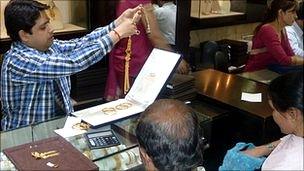India's middle class pays the price for growth
- Published

The Pawars took financial advice when they started losing their savings
The world is jealous of Asia's sky-high growth rates, but for ordinary people the price of success is corrosive inflation which could eat away their savings.
"From outside it looks good," says Manasi Pawar. "We're staying in a big house, paying so much in rent and our kids are going to great schools."
Manasi, a qualified software worker in hi-tech Hyderabad in India, recently became a full-time mother. Her husband also works in the IT industry.
The couple epitomise the emergence of a well-to-do middle class in Asian countries - except there's one significant snag.
"We were actually losing money," says Manasi.
The couple recently woke up to the fact that inflation rates of nearly 9% meant that their savings were actually disappearing in front of their eyes.
"We were sitting on a bunch of cash but we didn't know where to put it, and it's important that we don't let it lie there in the bank - because a bank doesn't give an interest rate that even matches the inflation rate," she says.
Intense inflation
The inflation rate measures how fast prices are going up.
Across Asia, various pressures are pushing inflation up - from growing wage bills to the high global prices of food, commodities and fuel in resource-hungry economies.
The pressures are so intense that some economists fear that inflation will now derail Asia's high economic growth altogether.
Inflation is the price that ordinary Asians are paying for high growth rates.
For the less well-off, who spend their money on food and fuel, the story is even worse. The rise in their household expenses at the moment is usually higher than headline inflation rates.
According to the International Monetary Fund, last year consumer prices rose 13.2% in India, 11.7% in Pakistan and 9.2% in Vietnam. Other Asian nations coped better but the average for developing Asia was 6% - compared to a 1.6% average rise in prices in advanced economies.
The speed at which prices are shooting up means that unless people find ways to save and invest effectively, they in fact get much poorer - even if Asia is getting richer.
Protected by pay rises?
"You don't need to worry too much if you're earning current rupees," advises Monika Halan, editor of Mint Money. "But the retired, the lower middle class and the poor have to worry."
Wages for employed people tend to rise along with inflation. Most workers still get an annual pay rise, which protects them to some degree. Some younger Indians don't even notice inflation's effects, as their pay swells every year.
But it's different if you live off money you have saved up. Anyone relying on their savings could be losing more than a 10th of their money each year - particularly hitting the elderly and retired.
The poorest people in society, who spend disproportionately more on food, are hit most savagely of all.
But there is a way to fight back against inflation: to save, and to put some of that money in a part of the economy that rises along with inflation.
For most people, that means investing in shares or equities. "The only way you can make money long-term is through an equity linked product," says Ms Halan.
Money in the bank in India may only earn 3% or 4% - which in fact means you are losing money. But equity linked funds in this exploding economy have risen much faster, sometimes as high as 25%.
Products with higher returns
But many Indians prefer to buy gold jewellery or property and do not understand or trust equities and shares. "The sad part is there is still a trust deficit - people don't trust the process of equity investing," said Halan.

In India heavy investment in gold is more common than in trust equities and shares
Manasi and her husband, Raghavendra, turned to a financial planner for advice on how to access savings products with higher returns. "We have to accept the fact that we are not the gurus in this market," said Raghavendra.
India now has a booming industry of financial advisers. But most people still go it alone when it comes to saving, although the majority do save something.
Unlike Western nations, India and the rest of Asia are home to the world's highest savings rates.
"But don't overdo it!" says Manasi with a smile. The couple are conscious of the fact that their rising incomes can best be enjoyed in the present.
"You can't put all your money into savings and be left with nothing for now," she says.
The opinions expressed are those of the contributors and not held by the BBC. The material is for general information only and does not constitute investment, tax, legal or any other form of advice. You should not rely on this information to make any investment decisions. Always obtain independent, professional advice for your own particular situation.